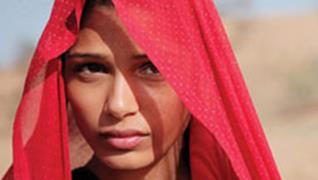Actress Deepti Naval's association with Buddhism as an adult dates back to her movie "Panchvati", based on a short story by
writer Kusum Ansal in 1985. She says she believes in the religion as it teaches to "live and let live".
"I was back after graduating from New York...And 'Panchvati' took me to Japan where it was screened at a festival. After the
festival, I visited Hiroshima and from there took off to island Miyajima. I was roaming around the island with my camera when I
heard chanting. It was most mesmerising...," Naval told.
"I was completely taken up... somebody said it was Buddhist chanting. It was completely contrasting to the jostling in
temples," added the 54-year-old who is here for the four-day Global Buddhist Congregation 2012 that started Sunday.
The movie adapted from the short story, "Ek Aur Panchvati", narrates the tale of a Sadhavi, a painter from Nepal who eventually
takes to Thangka paintings at the Pashupatinath Tample after a failed marriage.
The actress added she was moved by the "peace, quietude and security" of the temple chant (in Miyajima).
"In the early eighties, there was no sign of Buddhism in India...the idea of peaceful chant in a temple...this was wow. I returned
and started reading Buddha's teachings which influenced me - I constantly try to maintain a calm soul and try not to become
agitated," she added.
School books had given Naval the first insight into Siddhartha's life.
"Like all of us...we had all learnt in school how Siddhartha Gautama had moved on in his quest for answers," she said.
Talking about the Global Buddhist Congregation, Naval said, she is "attending it to understand the religion as an observer. I
came here to assimilate all that was going on.
"There are 900 members from different Buddhist sects. I wanted to know how they implement Gautama Buddha's teachings in
day-to-day life. When religious teachings become too ritualistic, I run. I don't like structures...I am an 'arya samaji', I have never
been a temple person."
"I go to the church when there are no rituals."
Naval is known for her portrayal of sensitive and powerful characters in movies like "Chashme Buddoor", "Ek Baar Phir", "Mirch
Masala" and several others. She also wears multiple personas as painter, photographer, poet, writer and human rights activist.
Buddhism guides Naval to Ladakh often in search of a spiritual soul.
"I take off to Ladakh twice a year quietly. I have had several exhibitions of Ladakh's winter, its landscapes. I have also lived in
the Likir monastery in Ladakh," she said.
The actress's new anthology of stories, "The Mad Tibetan - Stories from Then and Now" - is named after a short story about a
Tibetan Dervish in Ladakh - a maverick monk she met in Leh.
"I am working on a new anthology - 'The River and I' - a collection of my poems written during my wanderings in Ladakh," she
added.
The actress loved Buddhism because "it teaches one to love all human beings".
"To implement that would be difficult... but if implemented there would be no war between India, China and Pakistan," she said.
Religions lead to conflict because "they are so ritualistic", she said.
"The rituals clash with each other. If rituals are taken away from religion and only philosophy is at the heart, then there is
peaceful co-existence. There would be no 'mandir-masjid' (temple-mosque) rows in the world," she said.
Buddhism teaches to "live and let live", the actress said.
Film Panchvati introduced me to Buddhism: Deepti Naval
Monday, November 28, 2011 14:06 IST



















